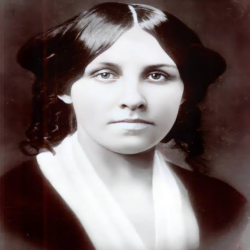
Louisa May Alcott
| Date of Birth | : | 29 Nov, 1832 |
| Date of Death | : | 06 Mar, 1888 |
| Place of Birth | : | Germantown, Philadelphia, Pennsylvania, United States |
| Profession | : | Short Story Writer, Novelist |
| Nationality | : | American |
Louisa May Alcott was an American novelist, short story writer, and poet best known for writing the novel Little Women and its sequels Little Men and Jo's Boys.
Early life
Louisa May Alcott was born on November 29, 1832, in Germantown, which is now part of Philadelphia, Pennsylvania, on her father's 33rd birthday. Her parents were transcendentalist and educator Amos Bronson Alcott and social worker Abigail "Abby" May. She was the second of four daughters: Anna Bronson Alcott was the eldest, while Elizabeth Sewall Alcott and Abigail May Alcott were the two youngest. As a child, she was a tomboy who preferred boys' games. The family moved to Boston in 1834, where Alcott's father established the experimental Temple School and joined the Transcendental Club with Ralph Waldo Emerson and Henry David Thoreau. Bronson Alcott's opinions on education, tough views on child-rearing, and moments of mental instability shaped young Alcott's mind with a desire to achieve perfection, a goal of the transcendentalists. His attitudes towards Alcott's wild and independent behavior and his inability to provide for his family created conflict between Bronson Alcott, his wife, and their daughters. Abigail reportedly resented her husband's inability to recognize her sacrifices and related his thoughtlessness to the larger issue of the inequality of sexes. She passed this recognition and desire to redress wrongs done to women on to Louisa.
Later years
In 1877, Alcott was one of the founders of the Women's Educational and Industrial Union in Boston. After her youngest sister May died in 1879, Louisa assumed the care of her niece, Lulu, who was named after Louisa. Alcott suffered chronic health problems in her later years, including vertigo. She and her earliest biographers attributed her illness and death to mercury poisoning. During her American Civil War service, Alcott contracted typhoid fever and was treated with Calomel, a compound containing mercury. Recent analysis of Alcott's illness suggests that her chronic health problems may have been associated with an autoimmune disease, not mercury exposure. However, mercury is a known trigger for autoimmune diseases as well. An 1870 portrait of Alcott does show her cheeks to be quite flushed, perhaps with the "butterfly rash" across cheeks and nose which is often characteristic of lupus, but there is no conclusive evidence available for a firm diagnosis.
Quotes
One of the sweet things about pain and sorrow is that they show us how well we are loved, how much kindness there is in the world, and how easily we can make others happy in the same way when they need help and sympathy.
Conceit spoils the finest genius.
We can't any of us do all we would like, but we can do our best for every case that comes to us, and that helps amazingly.
Stay" is a charming word in a friend's vocabulary.
I don't worry about the storms, I am learning to sail my own ship.
It takes three or four women to get each man into, through, and out of the world.
Simple, genuine goodness is the best capital to found the business of this life upon. It lasts when fame and money fail, and is the only riches we can take out of this world with us.
He who believes is strong; he who doubts is weak. Strong convictions precede great actions.
life and love are very precious when both are in full bloom.
Education is not confined to books, and the finest characters often graduate from no college, but make experience their master, and life their book. [Some care] only for the mental culture, and [are] in danger of over-studying, under the delusion . . . that learning must be had at all costs, forgetting that health and real wisdom are better.
